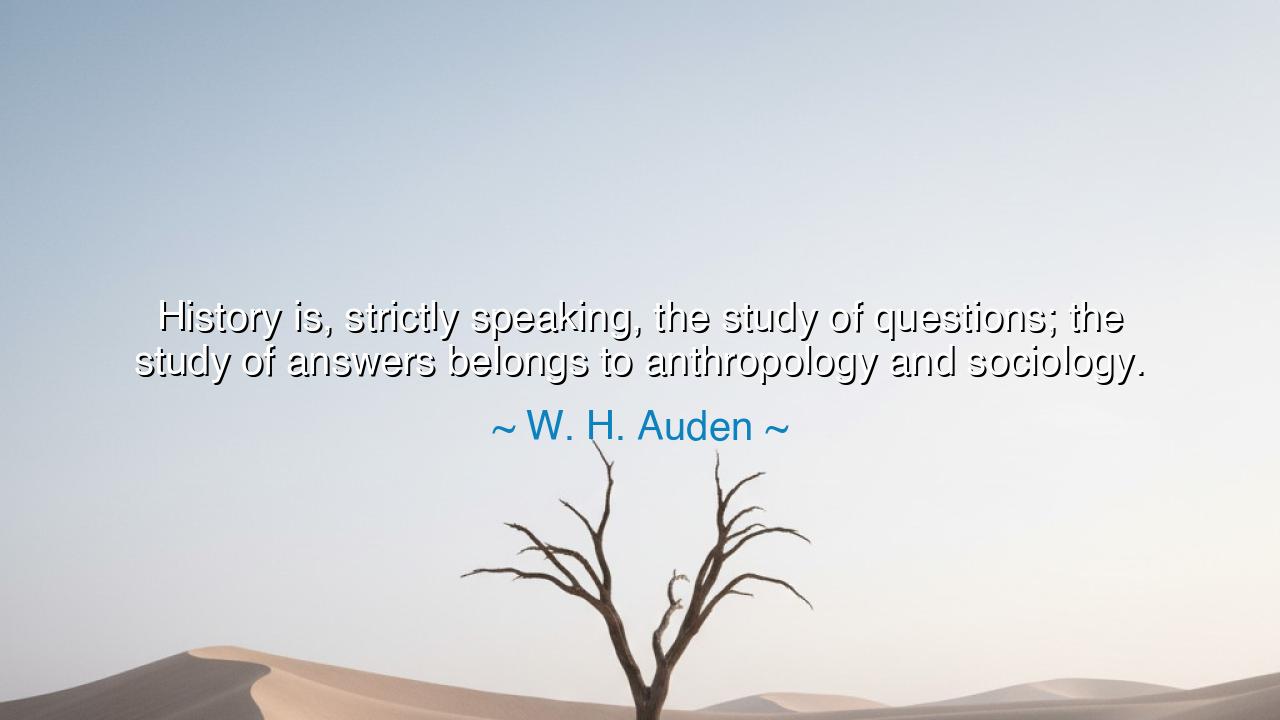
History is, strictly speaking, the study of questions; the study
History is, strictly speaking, the study of questions; the study of answers belongs to anthropology and sociology.






“History is, strictly speaking, the study of questions; the study of answers belongs to anthropology and sociology.” – W. H. Auden
Thus spoke W. H. Auden, the poet-philosopher whose words gleamed with both intellect and imagination. In this profound reflection, he divides the realm of human understanding into two kingdoms — one ruled by questions, and the other by answers. History, he tells us, is not the cold record of settled truths, but a living dialogue between the past and the present. It is the discipline of wonder — of asking why things unfolded as they did, what people sought, and how their choices shaped the world. The moment history believes it holds final answers, it ceases to be wisdom and becomes dogma.
The origin of this insight springs from Auden’s lifelong meditation on humanity — not merely as a poet of words, but as a scholar of civilization. He lived through the storms of the twentieth century: the Great Depression, the rise of fascism, and the devastation of two world wars. He saw that every age believes its answers are final, yet time reveals their frailty. Thus, he concluded that history is the study of questions, for in every turning point of human life, it is not certainty that drives us, but the hunger to understand. Anthropology and sociology, in his view, gather and explain the structures of human life — the customs, the systems, the behaviors — but history searches for something more elusive: the questions that stirred the hearts of men and women long ago.
In this, Auden speaks as the ancients once did. For the philosophers of old — from Herodotus, the “father of history,” to Thucydides, the chronicler of empire — history was not a mere listing of events, but an inquiry into the soul of action. When Herodotus wrote of kings and warriors, he did not simply record what they did, but sought to ask why they did it. Why does man wage war? Why do nations rise and fall? Why does power corrupt, and why do ideals fade? The historian, therefore, is not an archivist but a seeker, walking among the ruins of time in search of the eternal questions that shape the human heart.
A striking example of this truth lies in the story of Socrates, whose entire life was built upon questions. When the Athenians put him on trial for corrupting the youth, his defense was not an answer, but another question: “What is virtue?” He knew that truth begins where certainty ends. History remembers not the decrees of his judges, but the courage of his questions — questions that still guide philosophy after twenty centuries. So too, Auden’s quote reminds us that history preserves the questions of humanity’s journey — the why behind the wars, the longing behind the revolutions, the fear behind the empires. The answers, however, belong to later generations — to anthropologists and sociologists, who study how those questions became customs, beliefs, and systems.
History, then, is the record of humanity’s search for meaning. Each era asks its own questions: the Greeks asked, What is justice?; the medievals asked, What is God’s will?; the moderns ask, What is freedom?; and our own age asks, What is truth? These questions echo through time, shaping our art, our laws, our wars, and our dreams. But none are ever fully answered — for the moment we claim to have found the ultimate truth, the world changes, and new questions arise. History teaches humility: it reminds us that wisdom lies not in possessing all the answers, but in the endless pursuit of understanding.
Auden’s words also contain a quiet warning. The historian who believes his task is to explain rather than to inquire becomes a servant of ideology, not truth. The tyrant loves answers — fixed, unquestionable, and absolute — but the seeker of history loves questions, for they keep the spirit free. To study history rightly, therefore, is not to judge the past, but to listen to it. It is to hear the voices of those who once asked the same questions we now face — about justice, love, power, and the divine — and to learn from the echo of their striving.
So, my child of the modern age, take this teaching to heart: ask, do not assume; seek, do not settle. In your study of life, be as the historian — ever questioning, ever learning, never proud in your knowledge. Let anthropology and sociology teach you the patterns of human life, but let history teach you the courage to question why those patterns exist. For as Auden tells us, to live without questions is to live without wonder, and to live without wonder is to forget what it means to be human. Keep your mind open, your curiosity aflame, and your spirit humble before the great mystery of time — for in asking, not in answering, lies the path to truth.






AAdministratorAdministrator
Welcome, honored guests. Please leave a comment, we will respond soon